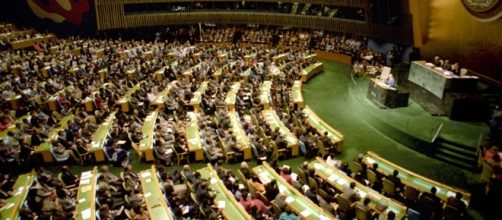The United Nations was born as a result to the Second World War which was itself the result of the failure of its predecessor the League of Nations. Both international bodies were created with vital input from The United States but paradoxically the international crisis over Syria involving the United States is showing the world that it has limits that need to be addressed to give it the capacity to act effectively in such periods of international tensions.
The current crisis between President Donald Trump and Russian President Vladimir Putin over the survival or removal of Syrian Dictator Bashar Al-Assad that has created even more tension between the two superpowers gives us definitive proof of the failings of the international body.
Security Council
The central body in the UN is the Security Council which makes the most important decisions on matters of international interest. While most of its membership changes regularly the Council has 5 permanent members, the United States, Russia (which replaced the former Soviet Union), China, France and Great Britain which hold veto powers on any motion presented to the Council.
Effectively the activities of the UN’s most important committee are governed on the whims and the foreign policy priorities of the winners of the Second World War. The veto power may have had a role in the immediate aftermath of the world’s most destructive war but now does not reflect political realities that would have been unthinkable in 1945.
One such is the creation of the European Union and another is the economic growth and importance of countries such as India and Japan.
Weakened
In forming the United Nations the intention of the five permanent members was to form an international body that would be able to prevent future wars. Sadly the UN was born at beginning of another form of warfare the Cold War.
As a result limits were placed on the capacities of the UN to react to international crises thus weakening it. The first was the lack of a permanent international military force capable of intervening in countries in crisis. Ostensibly this was for reasons of national sovereignty but it was also due to the problems of commanding these forces and it is easy to see that the United States, China and the Soviet Union/Russia would not want such a force to block their own plans for the future.
The second limitation is of course the one that we have seen regularly over the last seven decades, and the latest this week by Russia on the Syrian crisis, with the veto power of any of the five permanent members on any motion presented to the Security Council for action. This veto has been used not only in regards to direct actions for or against individual permanent members but also to protect allies of one or more the veto holding powers.
Sovereignty
The other issue that limits international interaction in countries in crisis is the concept of national sovereignty cited by Vladimir Putin in the his criticism of last week’s attack by the United States on the Syrian air force base in reply to the Al-Assad regime’s gas attack on the rebel town of Khan Sheikhoum.
The strictures of sovereignty limit intervention in civil wars yet the sovereignty of neighbouring countries is affected by the waves of refugees from these countries fleeing wars as we are now seeing in the countries bordering Syria and Iraq.
These inconsistencies must be addressed if the world wants to resolve the issues of refugees and other such humanitarian emergencies.
Naturally there are those in each country that want the United Nations to remain weak and powerless, especially those wary of so-called “world governments”, but there is no doubt that solutions must be found to reduce the international effects of what are effective domestic crises.
It is enough to see the impact of the refugees on public opinion in Europe to understand that a definitive long term solution must be found to end these crises as quickly as possible.
The intentions on the United Nations are praiseworthy but the reality has all too often been in its failure to act when required. It is time that the Body be given teeth and the capacity to act decisively, otherwise we are destined to see the same failures repeated for a long time into the future; failures that can only be attributed to the five permanent members of the Security Council.

